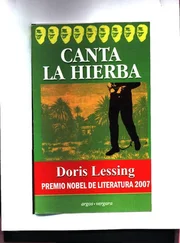‘There, my ducky,’ sang Roz, to Hannah.
‘Poor little pet,’ crooned Lil to Shirley.
Not long after this the two young women were in their new office, in the suite which would be the scene of their – they were convinced – future triumphs. ‘We are having a little celebration,’ they had said, making it sound as if there would be associates, sponsors, friends. But they were alone, drinking champagne and already tiddly.
It was the end of their first year. They had worked hard, harder than they had expected. Things had gone so well there was already talk of expanding. That would mean even longer hours, and more work for the grandmothers.
‘They wouldn’t mind,’ said Hannah.
‘I think they would,’ said Mary.
There was something in her voice, and Hannah looked to see what Mary was wanting her to understand. Then, she said, ‘It’s not a question of us working our butts off – and their working their butts off – they want us to get pregnant again.’
‘Exactly,’ said Mary.
‘I wouldn’t mind,’ said Hannah. ‘I told Ian, yes, but there’s no hurry. We can get our business established and then let’s see. But you’re right, that’s what they want.’
‘They,’ said Mary. ‘ They want. And what they want they intend to have.’
Here Hannah showed signs of unrest. Compliant by nature, biddable, she had begun by deferring to Mary, such a strong character, but now she was asserting herself. ‘I think they are very kind.’
‘They,’ said Mary. ‘Who the hell are they to be kind to us ?’
‘Oh, come on! We wouldn’t have been able to start this business at all without the grandmothers helping with everything.’
‘Roz is so damned tactful all the time,’ said Mary, and it exploded out of her, the champagne aiding and abetting. She poured some more. ‘They’re both so tactful.’
‘You must be short of something to complain about.’
‘I feel they are watching us all the time to make sure we come up to the mark.’
‘What mark?’
‘I don’t know,’ said Mary, tears imminent. ‘I wish I knew. There’s something there .’
‘They don’t want to be interfering mothers-in-law.’
‘Sometimes I hate them.’
‘ Hate ,’ Hannah dismissed, with a smile.
‘They’ve got them, don’t you see? Sometimes I feel…’
‘It’s because they didn’t have fathers – the boys. Ian’s father died and Tom’s went off and married someone else. That’s why the four of them are so close.’
‘I don’t care why. Sometimes I feel like a spare part.’
‘I think you’re being unfair.’
‘Tom wouldn’t care who he was married to. It could be a seagull or a… or a… wombat.’
Hannah flung herself back in her chair, laughing.
‘I mean it. Oh, he’s ever so damned kind. He’s so nice. I shout at him and I pick a fight, anything just to make him – see me. And then the next thing we’re in bed having a good screw.’
But Hannah didn’t feel anything like that. She knew Ian needed her. It was not only the slight dependence because of his gammy leg, he sometimes clung to her, childlike. Yes, there was something of the child in him – a little. One night he had called out to Roz in his sleep, and Hannah had woken him. ‘You were dreaming of Roz,’ she told him.
At once awake and wary, he said, ‘Hardly surprising. I’ve known her all my life. She was like another mother.’ And he buried his face in her breasts. ‘Oh, Hannah, I don’t know what I’d do without you.’
Now that Hannah was standing up to her, Mary was even more alone. Once she had felt, there’s Hannah, at least I’ve got Hannah.
Thinking over this conversation afterwards, Mary knew there was something there that eluded her. That was what she always felt. And yet what was she complaining about? Hannah was right. When she looked at their situation from outside, married to these two covetable men, well-known, well-set-up, well-off, generally liked – so what was she complaining about? I have everything, she decided. But then, a voice from her depths – I have nothing. She lacked everything. ‘I have nothing,’ she told herself, as waves of emptiness swept over her. In the deep centre of her life – nothing, an absence.
And yet she could not put her finger on it, what was wrong, what was lacking. So there must be something wrong with her. She, Mary, was at fault. But why? What was it? So she puzzled, sometimes so unhappy she felt she could run away out of the situation for good.
When Mary found the bundle of letters, forgotten in an old bit of luggage, she had at first thought they were all from Lil to Tom, conventional, of the kind you’d expect from an old friend or even a second mother. They began, Dear Tom and ended Love, Lil, with sometimes a cross or two for a kiss. And then there was the other letter, from Tom to Lil, that had not been posted. ‘Why shouldn’t I write to you, Lil, why not, I have to, I think of you all the time, oh my God, Lil, I love you so much, I dream of you, I can’t bear being apart from you, I love you I love you…’ and so on, pages of it. So, she read Lil’s letters again, and saw them differently. And then she understood everything. And when she stood on the path with Hannah, below Baxter’s Gardens, and heard Roz’s laughter, she knew it was mocking laughter. It mocked her, Mary, and she understood everything at last. It was all clear to her.
P.S. Insights, Interviews & More…
Meet Doris Lessing

© Ingrid von Kruse
Doris Lessing was born Doris May Tayler in Persia (now Iran) on October 22, 1919. Both of her parents were British: her father, who had been crippled in World War I, was a clerk in the Imperial Bank of Persia; her mother had been a nurse. In 1925, lured by the promise of getting rich through maize farming, the family moved to the British colony of Southern Rhodesia (now Zimbabwe). Doris’s mother adapted to the rough life of the settlement, energetically trying to reproduce what was, in her view, a “civilized” Edwardian life among “savages,” but her father did not, and the thousand-odd acres of bush he had bought failed to yield the promised wealth.
Lessing has described her childhood as an uneven mix of some pleasure and much pain. The natural world, which she explored with her brother, Harry, was one retreat from an otherwise miserable existence. Her mother, obsessed with raising a proper daughter, enforced a rigid system of rules and hygiene at home and then installed Doris in a convent school, where the nuns terrified their charges with stories of hell and damnation. Lessing was later sent to Salisbury, the capital of Southern Rhodesia, where she briefly attended an all-girls high school before dropping out. She was thirteen, and it was the end of her formal education.
But like other women writers from southern Africa who did not graduate from high school, such as Olive Schreiner and Nadine Gordimer, Lessing made herself into a self-educated intellectual. She once commented that unhappy childhoods seem to produce fiction writers: “Yes, I think that is true. Though it wasn’t apparent to me then. Of course, I wasn’t thinking in terms of being a writer then—I was just thinking about how to escape, all the time.” The parcels of books ordered from London fed her imagination, laying out other worlds to escape into. Lessing’s early reading included Dickens, Scott, Stevenson, and Kipling; later she discovered D. H. Lawrence, Stendhal, Tolstoy, and Dostoyevsky. Bedtime stories also nurtured her youth; her mother told them to the children, and Doris herself kept her younger brother awake, spinning out tales. Doris’s formative years were also spent absorbing her father’s bitter memories of World War I, taking them in as a kind of “poison.” “We are all of us made by war,” Lessing has written, “twisted and warped by war, but we seem to forget it.”
Читать дальше
Конец ознакомительного отрывка
Купить книгу












